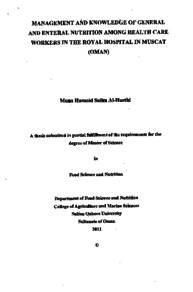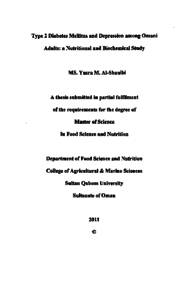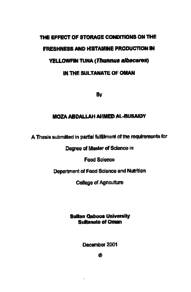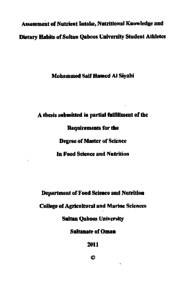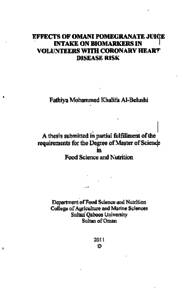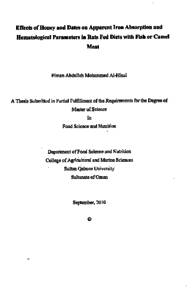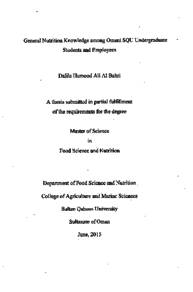Document
Management and knowledge of general and enteral nutrition among health care workers in the Royal Hospital in Muscat (Oman).
Publisher
Sultan Qaboos University.
Gregorian
2011
Language
English
English abstract
Background: Nutrition understanding in general and enteral nutrition knowledge in specific among health care professionals are important features that are needed to provide optimal medical care for the patient. The degree of knowledge, interest and training in enteral nutrition (EN) differs considerably among health care workers. These variations can lead to important differences in the management of the enteral feedings given to patients. Aims: The aims of this study were to evaluate the level of general and enteral nutrition knowledge among health care workers in the Royal hospital in Muscat as a tertiary referred hospital, and to assess the current enteral feeding practices and perceptions of responsibility and knowledge among health care workers in Oman. Consequently, proper recommendations are to be proposed. Method: A pre-tested, descriptive survey-based design was used to assess the level of general and EN knowledge among 927 health care workers (330 doctor, 593 nurse and 4 dieticians) at the Royal Hospital, Muscat, where only 341 of them responded (36.7%). Participants completed an 89-item questionnaire divided into 6 sections. The questionnaire addressed two areas: general nutrition awareness, and enteral nutrition knowledge including education, screening, monitoring, and planning. In addition, it included questions about barriers against nutrition therapy, sources of knowledge regarding enteral nutrition and enteral feeding practice. Results: The overall mean percentage for correctly answered questions in assessing general nutrition knowledge was 46.87%. Knowledge of health care professionals in screening, assessment, and treatment was inadequate. Many health care workers believed that they are greatly involved in the nutritional assessment, planning and implementation of intervention in their daily work. The involvement of dieticians and nutritionists in the decision-making process regarding the choice of enteral formulation was underestimated by the respondents (44.6%). However, the implementation of screening and assessment of enteral nutrition for patients in the hospital were considered by participants as successful. The main sources of nutrition knowledge were nursing/medical schools (68.32%), internet (69.20%), and the scientific journals (70,38%) with mean scores of 3.06+1.27, 2.92+1.30, and 2.87+1.19, respectively, out of 5. Enteral feeding practice is not fulfilled by following the enteral feeding protocol which is provided by the hospital, and that health care workers practice varied notably. Lack of knowledge, lack of interest, and lack of defined responsibilities were the main three barriers against appropriate nutrition therapy, being 72.43, 71.55, and 70.96%, respectively. Conclusion: Findings of the present study suggested that nutrition knowledge of health care professionals at Royal Hospital, Muscat, mainly for screening, assessment and treatment are inadequate. However, many health care workers believed that they are greatly involved in the nutritional assessment, planning and implementation of intervention in their daily work. In addition, enteral feeding practice is not fulfilled by following the enteral feeding protocol provided by the hospital, and that health care workers practice varied notably. The development and implementation of continuous nutrition education programs are recommended.
Member of
Resource URL
Arabic abstract
خلفية الموضوع: أن المعرفة في مجال التغذية بشكل عام والتغذية المعوية بشكل خاص بين المتخصصين في الرعاية الصحية هي عامل مهم من أجل توفير الرعاية الطبية المثلى للمريض. وتختلف درجة الاهتمام والمعرفة والتدريب في هذا المجال اختلافا كبيرا بين العاملين في مجال الرعاية الصحية، ويمكن لهذه الاختلافات أن تؤدي إلى تباينات كبيرة في طريقة إدارة التغذية المعوية التي تعطى للمرضى.
أهداف البحث: تتمثل أهداف هذه الدراسة بتقييم مستوى المعرفة في مجال التغذية بشكل عام وفي مجال التغذية المعوية بشكل خاص بين العاملين في حقل الرعاية الصحية في المستشفى السلطاني في مسقط ، وكذلك تقييم الممارسات الحالية في تطبيقات التغذية المعوية، بالإضافة إلى توضيح تلك المسؤولية العاملين في مجال الرعاية الصحية في سلطنة عمان.
طريقة البحث: تم استخدام دراسة وصفية سابقة لتقييم مستوى المعرفة في مجال التغذية العامة والتغذية المعوية حيث تم توزيع استبيانا مكونا من 89 سؤال في 6 أقسام على 927 موظفا عاملا في المجال الصحي في المستشفي السلطاني في مسقط (330 طبيبا، 593 ممرضا و 4 أخصائي تغذية، إلا أن 341 فردا فقط أكمل وأعاد الإستبيان ( 36 . 7 %). تناول الاستبيان مجالين هما : المعرفة في مجال التغذية بشكل عام ، والمعرفة في مجال التغذية المعوية بشكل خاص، بما في ذلك التعليم والتخطيط وطرق علاج المرضى المعتمدين على التغذية المعوية. وبالإضافة إلى ذلك تم إدراج تساؤلات حول الحواجز التي قد تحول دون تطبيق الطرق الصحيحة في العلاج ومصادر المعرفة بشان التغذية بشكل عام والتغذية المعوية بشكل خاص.
نتائج البحث: كانت النسبة العامة للأجابة الصحيحة على كافة الأسئلة هي 46 , 87 % ، كما تبين أن معرفة العاملين في مجال الرعاية الصحية في تقييم الحالة التغذوية للمريض وطرق الفحص والعلاج غير كافية. ويعتقد كثير من العاملين في مجال الرعاية الصحية بانهم يشاركون بشكل كبير في التخطيط والتقييم وتنفيذ ما يتوجب عليهم في عملهم اليومي مع المرضى المعتمدين على التغذية المعوية، حيث يعتقد المشاركون في الأستبيان بأن إشراك أخصائي التغذية في صنع القرار المتعلق بإختيار نوعية وطريقة التغذية المعوية لم يكن بالمستوى المطلوب (44 . 6 %) كانت المصادر الرئيسية للمعرفة في مجال التغذية في كليات التمريض / الطب ، وشبكة الإنترنت والمجلات العلمية (معدل المتوسط الحسابي 3 , 06 ، 2 , 92 و 2 , 87 على التوالي محسوبا من 5 , 00) أثبتت الدراسة بأن بروتوكول التغذية المعوية الذي تم توقيره من قبل المستشفى هو غير متبع حرفيا من قبل العاملين في هذا المستشفى ، وأن ممارسة العاملين في مجال الرعاية الصحية تختلف بشكل ملحوظ في تطبيقات هذا النوع من التغذية، وأن النقص في المعرفة ، وعلم الاهتمام وعلم وجود مسؤوليات محددة كانت أهم ثلاثة حواجز تحول دون التغذية المناسبة .
الأستنتاجات: أن معرفة العاملين في مجال الرعاية الصحية في المستشفي السلطاني في مسقط ، سلطنة عمان متمثلة في التقييم والعلاج الغذائي هو غير كاف. ومع ذلك ، يعتقد العديد من العاملين الصحيين في هذا المستشفى بأن لهم دورا كبيرا في المساهمة في تغذية المرضي وكذلك في تقييم وتنفيذ التداخل المطلوب في مجال التغذية المعوية . وبالإضافة إلى ذلك، فان بروتوكول التغذية المعوية الذي تم توفيره من قبل المستشفى لم يتم اتباعة كليا من قبل العاملين في هذا المستشفى ، حيث تختلف تلك الممارسة بين فرد واخر .
أهداف البحث: تتمثل أهداف هذه الدراسة بتقييم مستوى المعرفة في مجال التغذية بشكل عام وفي مجال التغذية المعوية بشكل خاص بين العاملين في حقل الرعاية الصحية في المستشفى السلطاني في مسقط ، وكذلك تقييم الممارسات الحالية في تطبيقات التغذية المعوية، بالإضافة إلى توضيح تلك المسؤولية العاملين في مجال الرعاية الصحية في سلطنة عمان.
طريقة البحث: تم استخدام دراسة وصفية سابقة لتقييم مستوى المعرفة في مجال التغذية العامة والتغذية المعوية حيث تم توزيع استبيانا مكونا من 89 سؤال في 6 أقسام على 927 موظفا عاملا في المجال الصحي في المستشفي السلطاني في مسقط (330 طبيبا، 593 ممرضا و 4 أخصائي تغذية، إلا أن 341 فردا فقط أكمل وأعاد الإستبيان ( 36 . 7 %). تناول الاستبيان مجالين هما : المعرفة في مجال التغذية بشكل عام ، والمعرفة في مجال التغذية المعوية بشكل خاص، بما في ذلك التعليم والتخطيط وطرق علاج المرضى المعتمدين على التغذية المعوية. وبالإضافة إلى ذلك تم إدراج تساؤلات حول الحواجز التي قد تحول دون تطبيق الطرق الصحيحة في العلاج ومصادر المعرفة بشان التغذية بشكل عام والتغذية المعوية بشكل خاص.
نتائج البحث: كانت النسبة العامة للأجابة الصحيحة على كافة الأسئلة هي 46 , 87 % ، كما تبين أن معرفة العاملين في مجال الرعاية الصحية في تقييم الحالة التغذوية للمريض وطرق الفحص والعلاج غير كافية. ويعتقد كثير من العاملين في مجال الرعاية الصحية بانهم يشاركون بشكل كبير في التخطيط والتقييم وتنفيذ ما يتوجب عليهم في عملهم اليومي مع المرضى المعتمدين على التغذية المعوية، حيث يعتقد المشاركون في الأستبيان بأن إشراك أخصائي التغذية في صنع القرار المتعلق بإختيار نوعية وطريقة التغذية المعوية لم يكن بالمستوى المطلوب (44 . 6 %) كانت المصادر الرئيسية للمعرفة في مجال التغذية في كليات التمريض / الطب ، وشبكة الإنترنت والمجلات العلمية (معدل المتوسط الحسابي 3 , 06 ، 2 , 92 و 2 , 87 على التوالي محسوبا من 5 , 00) أثبتت الدراسة بأن بروتوكول التغذية المعوية الذي تم توقيره من قبل المستشفى هو غير متبع حرفيا من قبل العاملين في هذا المستشفى ، وأن ممارسة العاملين في مجال الرعاية الصحية تختلف بشكل ملحوظ في تطبيقات هذا النوع من التغذية، وأن النقص في المعرفة ، وعلم الاهتمام وعلم وجود مسؤوليات محددة كانت أهم ثلاثة حواجز تحول دون التغذية المناسبة .
الأستنتاجات: أن معرفة العاملين في مجال الرعاية الصحية في المستشفي السلطاني في مسقط ، سلطنة عمان متمثلة في التقييم والعلاج الغذائي هو غير كاف. ومع ذلك ، يعتقد العديد من العاملين الصحيين في هذا المستشفى بأن لهم دورا كبيرا في المساهمة في تغذية المرضي وكذلك في تقييم وتنفيذ التداخل المطلوب في مجال التغذية المعوية . وبالإضافة إلى ذلك، فان بروتوكول التغذية المعوية الذي تم توفيره من قبل المستشفى لم يتم اتباعة كليا من قبل العاملين في هذا المستشفى ، حيث تختلف تلك الممارسة بين فرد واخر .
Category
Theses and Dissertations

